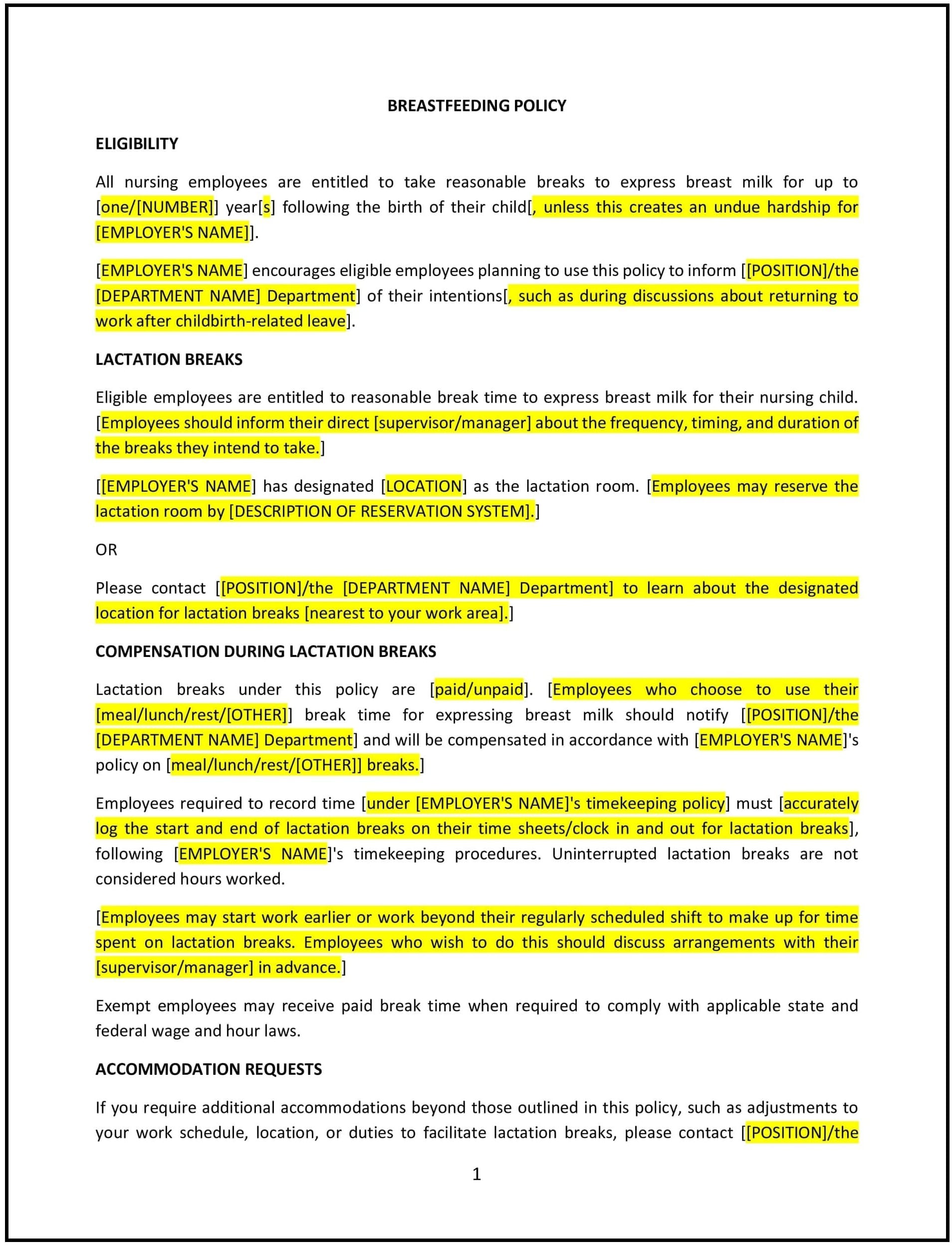Breastfeeding break policy (West Virginia): Free template
Got contracts to review? While you're here for policies, let Cobrief make contract review effortless—start your free review now.

Customize this template for free
A breastfeeding break policy helps West Virginia businesses support breastfeeding employees by providing time and space to express milk during work hours. This policy outlines the company's commitment to creating a supportive and compliant environment for nursing mothers, ensuring that they have adequate time and a private, hygienic space to breastfeed or express milk.
By implementing this policy, businesses can support work-life balance, comply with state and federal laws, and contribute to the health and well-being of employees and their children.
How to use this breastfeeding break policy (West Virginia)
- Define breastfeeding breaks: Clearly outline the amount of time employees will be allowed to take for breastfeeding or expressing milk, including whether the breaks will be paid or unpaid.
- Provide designated space: Specify that the company will provide a private, clean, and comfortable space for breastfeeding or expressing milk that is not a bathroom and is free from interruptions.
- Set break guidelines: Indicate how often employees will be allowed to take breastfeeding breaks and how long each break can last. Specify whether the breaks can be taken in addition to regular break times or whether they are included within the employee’s scheduled breaks.
- Address flexibility: Offer flexibility for employees who may need more or fewer breaks depending on their individual circumstances, ensuring that the policy supports their needs without disrupting business operations.
- Ensure confidentiality: Ensure that employees’ breastfeeding or milk expression breaks are handled discreetly, and that their personal information and needs are kept confidential.
- Comply with legal requirements: Ensure the policy is in compliance with federal regulations, such as the Fair Labor Standards Act (FLSA), and West Virginia state laws that provide protections for breastfeeding employees.
Benefits of using this breastfeeding break policy (West Virginia)
This policy offers several benefits for West Virginia businesses:
- Promotes health and well-being: Supporting breastfeeding employees helps improve the health of both mothers and children, leading to healthier, more engaged employees.
- Enhances employee retention: Providing breastfeeding support demonstrates the company’s commitment to work-life balance, helping to retain talented employees, particularly new mothers.
- Supports compliance with the law: This policy helps improve compliance with both federal and state laws, including the FLSA, which mandates reasonable breastfeeding breaks for nursing mothers.
- Increases employee satisfaction: Offering supportive and flexible breastfeeding breaks contributes to a positive work environment, increasing overall job satisfaction and morale.
- Supports diversity and inclusion: Providing a family-friendly workplace ensures that all employees, regardless of their parental status, are supported in balancing their professional and personal lives.
Tips for using this breastfeeding break policy (West Virginia)
- Communicate the policy clearly: Ensure that all employees, particularly new mothers, are aware of their right to breastfeeding breaks and the available resources.
- Provide appropriate facilities: Ensure that the designated breastfeeding space is private, clean, comfortable, and free from distractions, providing the necessary amenities for breastfeeding or expressing milk.
- Be flexible: Offer flexibility in the number and duration of breastfeeding breaks to accommodate individual needs, ensuring that breaks do not negatively affect productivity.
- Offer support: Consider offering additional resources or programs to support breastfeeding employees, such as lactation consulting or access to nursing rooms in other locations.
- Review regularly: Periodically review the policy to ensure that it is compliant with changes in state and federal laws, and that it continues to meet the needs of employees.